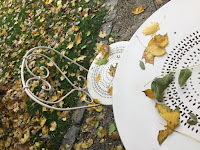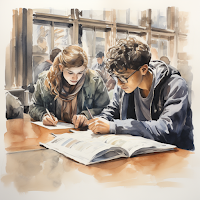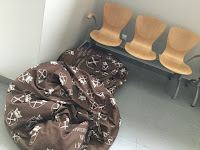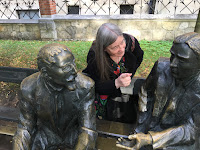For those of you who qualitative researchers:
- Firstly, videos showing how generative AI can be used in qualitative analysis are included in the series Research with Dr Kriukow https://www.youtube.com/@QualitativeResearcher/videos [NB this account was hacked on 5th Jan 24 so may be unavailable - see https://drkriukow.com/]
- Secondly, from the expert in online interviews, Dr Janet Salmons, is the video Technology, Communication and E Interview Structures https://youtu.be/9ThgRc7QZ78?feature=shared again part of a Youtube channel on qualitative research https://www.youtube.com/@jesalmons/videos
- Finally, a 20 minute video Trustworthiness (Rigour) Criteria in Qualitative Research
from Dr Yazdan Mansourian https://youtu.be/vyN6sTa_n1o?feature=shared
Photo by Sheila Webber: Xmas wreath (not mine), December 2023
Sunday, December 31, 2023
Videos about qualitative research
Saturday, December 30, 2023
Archipelago of Information Science
Dr Jenna Hartel has put a video series An Archipelago of Information Science on her Youtube channel. This series of short and imaginative videos "explores ideas on the frontier of Information Science. It enacts the metaphor of an island chain—an archipelago—of incipient concepts existing still somewhat offshore of the Information Science 'mainland.' " - it arose from the excellent keynote at ECIL that Pam McKinney blogged here in October.
This is the link to the playlist https://www.youtube.com/playlist?list=PLZp7Vke_WTVpFc-vT3Yv6he9iNFztRvAg and the introduction is embedded below.
There is also a souvenir map
Thursday, December 28, 2023
Exploring AI pedagogy
An interesting resource is Exploring AI pedagogy: A Community Collection of Teaching Reflections, which has summaries/reflections on teaching related to AI, posted by university lecturers
"Have you tried something in your classroom related to AI that excited or disappointed you? Is there a classroom activity that has made you hopeful about the future of AI in higher ed? Maybe you tried out a pedagogical practice that you heard about from a colleague and have some reflections to offer? On this site, you can share your pedagogical experiences with colleagues and reflect on successes, failures, and results that leave us perplexed."
A good source to dip into for ideas. Created by the MLA-CCCC (The Modern Language Association and Conference on College Composition and Communication) Joint Task Force on Writing and AI. The resource is at https://exploringaipedagogy.hcommons.org/ and it includes a google form you can use to submit your own intervention/ reflection.
Photo by Sheila Webber: house with wreath in London, December 2023
Wednesday, December 27, 2023
Webinar: Building Inclusive Online Tutorials
There is a free webinar on 7 February 2023 at 2pm US Eastern time (which is, e.g., 7pm UK time): Building Inclusive Online Tutorials, presented by Abigail Mann
"We will discuss content and structure choices that are possible in online tutorials to create inclusive, welcoming learning environments even without the benefits of personal interaction. Topics covered include diverse visual cues, multimodal approaches, and gender inclusive language."
It is part of the Carterette series of webinars, organised by the US Georgia Library Association.
Register at https://us06web.zoom.us/webinar/register/WN_tnRNakwQSdSursACqo_W8w
Photo by Sheila Webber: wreaths of South London, December 2023
Tuesday, December 26, 2023
Webinar: Information Literacy through Theory
Monday, December 25, 2023
Merry Christmas to all information literacy enthusiasts
Friday, December 22, 2023
Algorithm literacy
Augustinus, M. (2022). What do we talk about when we talk about algorithmic literacy? A scoping review. (Masters dissertation). University of Boras. https://www.diva-portal.org/smash/get/diva2:1732027/FULLTEXT01.pdf. A useful review.
Archambault, S.G. (2023). Toward a new framework for teaching algorithmic literacy. Information and Learning Sciences, (early online publication) https://doi.org/10.1108/ILS-07-2023-0090. This is not open access, so here is some more information:
"Eleven semistructured interviews and one focus group were conducted with scholars and teachers of critical algorithm studies and related fields. A content analysis was manually performed on the transcripts using a mixture of deductive and inductive coding. Data analysis was aided by the coding software program Dedoose (2021) to determine frequency totals for occurrences of a code across all participants along with how many times specific participants mentioned a code. Then, findings were organized around the three themes of knowledge components, coping behaviors and pedagogy.
Findings: The findings suggested a set of 10 knowledge components that would contribute to students’ algorithmic literacy along with seven behaviors that students could use to help them better cope with algorithmic systems. A set of five teaching strategies also surfaced to help improve students’ algorithmic literacy."
The knowledge components were: Bias causes (what causes bias); Black box (understanding how much of algorithms was hidden);common misconceptions; algorithm strengths; machine learning vs rule based; key algorithmic operations; human-algorithm interplay; algorithmic reasing vs human reasoning; commodification; infrastructure.
The coping behaviours were: Recognise across domains in everyday life; privacy of personal data; folk theories; gaming the system; broader advocacy (becoming an activist in raising issues); critical evaluation; scepticism anarchy.
The pedagogogic strategies were: tactile (buildingalgorithms); data transparency tools; speculative futuring; perspective taking; expectancy violation.
Image by Sheila Webber using Midjourney AI - using the prompt Sheila Webber. I don't look like that
Thursday, December 21, 2023
#LILAC24 bursaries
They prioritise: Individuals who have not previously attended a multi-day national/international conference; Individuals from groups underrepresented and/or marginalised in the library and information profession, including (but not limited to): LGBTQIA+, disabled and neurodivergent applicants, and applicants from BAME backgrounds; Student members; New professionals (less than 5 years' experience); Members who earn below £23,000 per annum or are unwaged.
Full info at https://www.cilip.org.uk/members/group_content_view.asp?group=201296&id=1020639.
Photo by Sheila Webber: inside the Rodin museum, November 2023
Wednesday, December 20, 2023
Webinar: Connectivity & Digital Disruption: The Digital Divide
On 21 December 2023 at 12 noon US EST (which is 17.00 UK time) there is a free webinar Connectivity & Digital Disruption: The Digital Divide.
"Susan Wiesinger and Ralph Beliveau discuss their new book, Digital Literacy: A Primer on Media, Identity, and the Evolution of Technology 2nd edition. This book, which is directed to young undergraduate students, seeks to inspire an attitude of inquiry toward media experiences. Central to such inquiry would be considerations of equal and unequal conditions as they proliferate across American culture, and then engage with global cultures. This discussion seeks to engage with the media literacy community to consider what can be done to reduce such inequalities while also recognizing and celebrating cultural differences. Breakout discussions will allow for closer attention to the way participants have experienced these divides locally."
The webinar includes time for discussion on: "What should the role of government be in reducing inequality? How are freedoms connected to access and education being effected by authoritarian tendencies? What can be done to encourage better and more equal experiences in the digital sphere?"
This is part of a series on inequalities and media education
Full details and registration at https://mediaeducationlab.com/events/connectivity-digital-disruption-digital-divide
Photo by Sheila Webber: shadows on the wall, December 2023
Tuesday, December 19, 2023
New articles: Health literacy in Bangladesh; Postgraduates' information literacy
Firstly, the first issue of open access Journal of Graduate Librarianship is at https://dc.etsu.edu/jgl/. I think that "graduate librarianship" is librarians who are providing services to postgraduate students - Masters or PhD students. The first issue includes
- A Two-Phase Study Examining Graduate Library Student Knowledge Gains and Perceptions of Information Literacy Modules by Holly S. Hebert, Karen V. Nourse, and Kevin S. Krahenbuhl
Secondly the latest issue of the open access IFLA Journal (Volume 49, No. 4 (December 2023) at https://repository.ifla.org/handle/123456789/3159 includes
- Community engagement of public libraries for ensuring tribal women’s
health literacy in Bangladesh
by
Shamima Yesmin, Md Abdul Karim and Md Atikuzzaman.
Abstract
"The main aim of this study is to
investigat epublic libraries’ responses and willingness in providing
health information services to tribal communities. Data was collected
from11 library professionals using a structured
interview method and 276 tribal women through a survey. The data was
then analysed using the Statistical Package for the Social Sciences (SPSS).The findings show that most of
the
participating libraries (72.8%) did not provide any specific service for tribal-community engagement, although
all of them were very positive in initiating it. On the other hand,
the majorityof the tribal women were interested in getting health-related
information from public libraries. ‘Community engagement fo rhealth
literacy’ could be a new formula for tribal communities in this regard."
Photo by Sheila Webber: autumn leaves in Paris, November 2023
Monday, December 18, 2023
Information literacy and society report
The UK's Media and Information Literacy Alliance (MILA, which is separate from UNESCO's MIL Alliance) has released a report, the Information literacy and society report, produced by a group of researchers at Edinburgh Napier University, Scotland, which was commissioned to review of research about the impact of Information Literacy on society.
"The review finds that the core research that investigates the role of IL in society is geographically skewed towards the anglosphere and the first world. Education, particularly tertiary education, is significantly over-represented in the IL research literature. Barriers to shaping information-literate populations are raised by issues around IL teaching and structures that could support it, including government (in)action."
The full report, including full references, can be found at https://mila.org.uk/wp-content/uploads/2023/11/ILS-final-project-report-AS-PUBLISHED.bmrV2_.pdf
Photo by Sheila Webber: in the gardens of the Musee Montmartre, November 2023
Friday, December 15, 2023
PIL climate study
Project Information Literacy has started a new project, focusing on information about climate change "a large-scale survey of U.S. residents between 16 and 85 years old to delve into how their encounters with climate change news and information — and the behaviors that manage those encounters — shape Americans’ disparate responses to the worldwide climate crisis." It started this autumn with a survey of 4500 members of the general public in the USA. There is more information here https://projectinfolit.org/faq-pil-climate-study/
Photo by Sheila Webber: snowman, December 2023Thursday, December 14, 2023
New book: Everyday Evidence-Based Practice
ACRL has published Everyday Evidence-Based Practice in Academic Libraries: Case Studies and Reflections, (eds. - Claire Walker Wiley, Amanda B. Click, and Meggan Houlihan). US $84.00, or $75.60 to ALA Members. Item Number: 978-0-8389-3985-7. It is in 5 parts, and part 3 is Instruction and Outreach, with 3 chapters:
- Everyday Evidence to Assess Teaching and Learning: A Programmatic Assessment of Library Instruction by Matthew Weirick Johnson, Michelle Brasseur, Monica Hagan, Diane Mizrachi, and Jimmy Zavala
- Incorporating a Lesson Study Approach to the Development of an Evidence Synthesis Workshop Series by Zahra Premji and K. Alix Hayden
- Out of Context: Incorporating Intersectionality in Information Literacy Instruction by Matthew Chase
Details of the book at https://www.alastore.ala.org/content/everyday-evidence-based-practice-academic-libraries-case-studies-and-reflections
Photo by Sheila Webber: Renoir gardens at the Musee de Montmartre, Paris, November 2023
Wednesday, December 13, 2023
Cat Park
Another game highlighting the problems of disinformation spread by social media is Cat Park. You play someone who (spoiler alert) is initially manipulated to spread propaganda to destroy a cat park and then (once the real plan behind this is revealed) you try and spread some facts to make things better. It is free for all to use at https://catpark.game/ and is professionally done (could be even more cats, though!). It works with Chrome (possibly not with Firefox).
I found out about this game from a an article in which the researchers found "that people who play Cat Park find misinformation significantly less reliable post-gameplay (d = 0.95, p < 0.001) compared to a control group, and are significantly less willing to share misinformation with people in their network (d = 0.54, p < 0.001)." However it didn't improve their confidence in identifying misinformation.
Neylan, J., Biddlestone, M., Roozenbeek, J. et al. (2023). How to “inoculate” against multimodal misinformation: A conceptual replication of Roozenbeek and van der Linden (2020). Scientific Reports, 13, article 18273. https://www.nature.com/articles/s41598-023-43885-2#Sec2
Image by Sheila Webber using Midjourney AI, with prompt cat park, pastel colours, park with cats, --ar 16:9 (not sure those are all cats!)
Tuesday, December 12, 2023
ACRL companion document: Instruction for Educators
I had missed The Companion Document to the ACRL Framework for Information Literacy for Higher Education: Instruction for Educators which was approved by ACRL in June 2023. It "provides links to standards used in teacher education and connects the standards to the ACRL Framework to make information literacy practical and relevant to teacher education students as they work on course assignments, prepare for careers as teachers, and for work in the classroom."
"The Companion Document addresses three roles that information literacy plays in teacher education: supporting teacher education students' classroom work in their teacher education program; preparing teachers for research skills needed in their career; and preparing teachers to support the information needs and practices of their students."
Go to https://acrl.libguides.com/ed
Photo by Sheila Webber: Eiffel Tower, November 2023
Monday, December 11, 2023
Global Education Monitoring report 2023
UNESCO has produced the Global Education Monitoring report (GEM) which "addresses the use of technology in education around the world through
the lenses of relevance, equity, scalability and sustainability." One of the background papers is on Media and Information Literacy, by Divina Frau-Meigs https://unesdoc.unesco.org/ark:/48223/pf0000386080.locale=en The page with links to the background papers is here https://www.unesco.org/gem-report/en/technology-background-papers
To pull out one finding from the main GEM report:"Technology offers an education lifeline for millions but excludes many more.
- „Accessible technology and universal design have opened up opportunities for learners with disabilities. About 87% of visually impaired adults indicated that accessible technology devices were replacing traditional assistive tools.„
- Radio, television and mobile phones fill in for traditional education among hard-to-reach populations. Almost 40 countries use radio instruction. In Mexico, a programme of televised lessons combined with in-class support increased secondary school enrolment by 21%.„
- Online learning stopped education from melting down during COVID-19 school closures. Distance learning had a potential reach of over 1 billion students; but it also failed to reach at least half a billion, or 31% of students worldwide – and 72% of the poorest.„
- The right to education is increasingly synonymous with the right to meaningful connectivity, yet access is unequal. Globally, only 40% of primary, 50% of lower secondary and 65% of upper secondary schools are connected to the internet; 85% of countries have policies to improve school or learner connectivity."
https://www.unesco.org/gem-report/en/technology
Photo by Sheila Webber: Antony Gormley statues at the Rodin Museum, November 2023
Sunday, December 10, 2023
Women's history 2023 advent calendar
The women's history 2023 advent calendar has "favourite new (and sometimes not so new) sites and resources of the year for women’s studies and womens history" https://calendar.myadvent.net/?id=nt1kee5497mdo9efkzij7kqyil69xnum
Friday, December 08, 2023
Cfp: 3rd International Conference on Information Literacy (ICIL-Africa 2024)
There is a call for papers for the 3rd International Conference on Information Literacy (ICIL-Africa 2024), a sister conference to the European Conference on Information Literacy (ECIL). It is organised by the North-West University (NWU), in collaboration with Bibliotheca Alexandrina and the University of Pretoria and will take place in the Bibliotheca Alexandrina in Egypt, on 14-17 October 2024.
The deadline for abstracts is 15 March 2024 and the theme for the conference is Information Literacy Revolution: Get Ready!
Submission types are: Individual papers and posters; PechaKucha; Doctoral forum; Panel discussions.
The proposed topics are: Artificial Intelligence and Information Professionals; AI and Library Operations: Improving Library Services; Information Literacy and Smart libraries; Information Literacy Robotic Process Automation; Data and AI Literacy; Information literacy and sustainability in libraries; Information literacy/ media literacy and the battle against disinformation (fake news, reliable/unreliable resources); Information literacy and emerging technologies trends emerging since COVID -19; Information literacy and new paradigms: digital literacy, digital competencies, digital skills, and digital thinking.
More information at https://bibalex.org/baifa/en/page/ICIL-Africa2024submissions
Photo by Sheila Webber: The Thinker, Rodin Museum, November 2023
Thursday, December 07, 2023
New secretary for Scottish CoP @Bruce_Research
Bruce Ryan, of Napier University, is becoming the new Secretary of the Scottish Information Literacy Community of Practice, so it's a good moment to highlight that this group is still active. They have brought together stakeholders and also interacted with the Scottish Executive in a more active way than has been possible with the UK Government. Activities include, for example, a forthcoming meeting in Scotland to disseminate the Bridge project.
Their website needs updating with the latest information (something I imagine Bruce will be able to help with!) but it still has very interesting material, including their inspirational Scottish Information Literacy Framework (an early lifelong framework).
Wednesday, December 06, 2023
New articles: Indigenous IL; Artists; Community representation; Clinical judgement in nursing; 1st gen students; Australian librarians; Toffler
The latest issue of open access journal Journal of Information Literacy contains the following articles and also some book reviews. Go to https://journals.cilip.org.uk/jil/issue/view/46
- Information as a relation: Defining Indigenous information literacy by Sandra Littletree, Nicola Andrews, Jessie Loyer
- Emerging artists in transition: What role does information play in negotiating success and failure? by Maud Cooper
- An information literacy lens on community representation for participatory budgeting in Brazil by Peter Cruickshank, Bruce Ryan
- Engaging with practice: Information literacy instruction as a part of developing reflective thinking and clinical judgement in nursing studies by Margrethe Bakstad Søvik, Kari Røykenes
- Insights on first-generation students’ development of social capital for the rigours of college-level research by Leslin H. Charles
- Artificial intelligence literacy in libraries: Experiences and critical impressions from a learning circle by Karolina Andersdotter
- Giving voice to regional Australian academic librarians: Perceptions of information literacy and information literacy instruction by Annette Goodwin, Waseem Afzal
- Information literacy: Did Alvin Toffler beat Paul Zurkowski to it? by Andrew Shenton
Image created by Sheila Webber with Midjourney AI - the prompt was the string of words in the subject line
Tuesday, December 05, 2023
#MILCLICKS in The Gambia
This short news item from UNESCO reports on a session they supported at the Gambia's Youth Connekt conference in October 2023, the session being on using media and information literacy to combat hate speech, misinformation, and disinformation. Go to https://www.unesco.org/en/articles/media-information-literacy-avenue-youth-combat-hate-speech-misinformation-disinformation
Monday, December 04, 2023
Information Literacy presentations
Presentations from the LOEX Fall Focus conference held in November 2023 have been posted. One focus was developing colleagiues research and practice (for example materials are given from a workshop on Cultivating Community with Future Colleagues: Reference and Instruction Skill Building) Another theme was the first year experience, including first-generation students (e.g. More Than One Shot: Collectively Scaffolding Information Literacy in the First-Year Seminar and they include a link to lesson plans at http://lib.uncw.edu/il-uni101) There are also materials from a workshop on Generative Discussions on Generative AI: Preparing Librarians to Teach about Artificial Intelligence.
Go to https://loexfallfocus.org/session-materials/
Photo by Sheila Webber: Napoleaon's tomb, Paris, November 2023
Sunday, December 03, 2023
Podcast: Let’s Talk About Media and Communication
In the latest podcast Mathias-Felipe de-Lima-Santos talks about Google News Initiative: A double-edged sword for journalism (arguing it could undermine independent journalism: this is the article they are talking about). This is the podcast's home page https://www.cogitatiopress.com/wp/topics/mac
Photo by Sheila Webber taken in Second Life - the podcaster, November 2023
Friday, December 01, 2023
Teaching and Learning with Digital Primary Sources
There is a new report from Choice and JSTOR about Teaching and Learning with Digital Primary Sources: Nine insights into awareness, literacy, and collaboration between librarians, faculty, and students. You have to give some details about your name, place of work etc. before you can get the free download. The report includes brief interviews with 5 librarians who support teaching or teach IL using primary sources.
You can download the report at https://www.choice360.org/research/teaching-and-learning-with-digital-primary-sources-nine-insights-into-awareness-literacy-and-collaboration-between-librarians-faculty-and-students/
You can also see the launch webinar (November 14, 2023) here: https://youtu.be/dqdbBmiptW0?feature=shared
Image by Sheila Webber using Midjourney AI using prompt ancient manuscripts, in museum cases, hyperreal
Thursday, November 30, 2023
Webinar: From In-Person to Online & Back Again: Converting Information Literacy Instruction Between Formats
There is a free LiLi Show and Tell session on 13 December 2023 at 10.00 US Pacific time (which is, e.g. 18.00 UK time) From In-Person to Online & Back Again: Converting Information Literacy Instruction Between Formats, presented by Monica Maher (Online Learning & Education Librarian, University of Nebraska Omaha, USA).
"Continuous assessment and editing of information literacy instruction is essential to assure our students are meeting their learning outcomes. Over the last three years, especially during the COVID-19 pandemic, many aspects of our lives and jobs have been altered. It comes as no surprise then, that our lesson plans must change as well! This session will focus on one librarian’s reflections about converting information literacy instruction for undergraduate and graduate students from in-person, to online, and then back to in-person again. How to gain meaningful faculty collaboration, tips and tricks for identifying the best format for your instruction, sustainability best practices, and lessons learned will be discussed."
Register at https://northampton-edu.zoom.us/meeting/register/tJYkc-GtrjwpHtdhLnVPeshBXbJ8BuUxAsHe
Wednesday, November 29, 2023
Call for Proposals: Institute for Information Literacy at Purdue research grants
The Institute for Information Literacy at Purdue University, USA, is offering five $4,000 two-year Research Grants. The deadline for applications is 31 March 2023. The Institute will fund research projects that examine complex information challenges within select contexts and aim to develop or enhance information literacy models that enable people to successfully navigate and contribute to today’s information environment. The Institute supports and shares innovative, community- or context-specific information literacy research (i.e. healthcare, social media, publishing).
"As information literacy is interdisciplinary by nature, projects that demonstrate a substantive collaboration between research from different fields (such as psychology or political science and information studies) will be prioritized for funding. ... priority will be given to projects that focus on effective information practices applied in a range of contexts and communities. This is offered with support from the Esther Ellis Norton Endowment. ... Projects should aim to inform the development or enhancement of an information literacy model or technique that supports individuals, communities, or organizations in using information wisely."
Applicants need to submit a 2-3 page proposal including project title, team members (including their expertise in subjects relevant to the proposed project), budget information, a statement of benefits for stakeholders, alignment with Institute research award priorities, expected budget and justification, and references cited.
There should also be a 2-page CV for each project team member. "Successful proposals will clearly define the need to examine the particular information challenge in the proposed context and how they aim to carry out the research using an award from the Institute.They should email InstituteIL@purdue.edu with the subject line “IILP Research Grant Proposal”.
Full information at https://docs.google.com/document/d/14Jff2sv-H-ujgRzTb65TIcFcl5S3fe03/edit#heading=h.vkpzmyo9bys0
Photo by Sheila Webber: autumn falling, November 2023
Tuesday, November 28, 2023
José Luis Agraz wins information literacy award
The Universal Information Literacies Association has announced the inaugural Information Literacy Paul G. Zurkowski Esquire Global Individual Award which "recognizes the outstanding contributions of global leaders in advancing information literacy and critical thinking in public service on a global scale." The award winner is José Luis Agraz (Information Officer and Biologist, Secretaría del Tratado Antártico.
"Mr. Agraz is tasked with serving as documentation officer for the Antarctic Treaty Consultative Meeting (ATCM) and the Committee for Environmental Protection (CEP) and coordinating development, maintenance and accuracy of the Secretariat’s information systems. In addition, he is responsible for balancing access of scientific and operational information to comply with requirements in the scope of the Antarctic Treaty with his evaluation of the relevant impact of human activities on terrestrial environments. Having managed this vast array of data and responsibilities using the core concepts of Information Literacy and critical thinking for peaceful purposes to help the people of the world, the UiLA bestows the inaugural Information Literacy Paul G. Zurkowski Esquire Global Individual Award on José Luis Agraz."
Saturday, November 25, 2023
Reading's importance: a manifesto and an article
Firstly, The Importance of Higher-Level Reading: A Manifesto, launched at the Frankfurst Book Fair - you can sign this manifesto if you agreed with your argument that higher-level reading (sustained reading etc.) is "our most powerful tool for analytic and strategic thinking". Go to https://readingmanifesto.org/#. Also they link to an article:
Schüller-Zwierlein, A., Mangen, A., Kovač, M. & van der Weel, A. (2022). Why higher-level reading is important. First Monday, 27(9). https://firstmonday.org/ojs/index.php/fm/article/download/12770/10709 "While digital technologies offer much potential for new forms of reading, recent empirical research shows that the digital environment is having a negative impact on reading, in particular on long-form reading and reading comprehension. It also remains unclear whether the transition to digital media actually lives up to its promise of improving learning outcomes. Recent studies of various kinds indicate a decline of crucial higher-level reading competencies and practices, such as critical and conscious reading, slow reading, non-strategic reading and long-form reading. Current educational policy, meanwhile, relies heavily on monocultural standardized testing of basic reading capabilities and on growing use of digital technologies. Reading education, assessment, research and policy-making should focus more on higher-level reading practices in both adults and children in order to understand the development of reading skills and practices in an age increasingly dependent on a ubiquitous digital infrastructure."
Photo by Sheila Webber: in the gardens of the Musée de Montmartre, November 2023
Thursday, November 23, 2023
RUSA/ETS Best Emerging Technology Application (BETA) Awards
You can apply for one of two RUSA/ETS Best Emerging Technology Application (BETA) Awards if you have "used technology in an innovative way to enhance your library or patron services." "The awards offer $3,000 each to an individual or group in recognition of a technology project that directly benefits library users." Submission deadline is 23 February 2024. There are 2 categories:
(1) "Develops an original technology or significantly modifies an existing technology for an entirely novel use that benefits the library and its patrons."
(2) "Utilizes an existing technology and applies it in a novel way that benefits the library and its patrons.
" The award is open to any library employee or group of library employees, and you don't have to be based in North America. The initiative has to have taken place no more than 2 years prior to the date of the application deadline.
For more info including the evaluation criteria go to http://bit.ly/RUSABETA.
Photo by Sheila Webber: tomb of Napoleon, Les Invalides, November 2023
Tuesday, November 21, 2023
Call for papers: Fact-Checkers Around the World
"This thematic issue brings together scholars who study fact-checking organizations, practices, and institutions around the world. Fact-checkers work in a wide variety of media and political systems. Even where practices converge, they understand their own mission—and the wider problem of misinformation—in very different ways. These vital differences remain underexplored and can offer a revealing lens for journalism studies and political communication researchers to investigate changing media systems around the world.
"To address this gap, this thematic issue highlights research with a regional or comparative focus, as well as studies of the wider global movement. We invite work across methods and theoretical traditions, from ethnographic case studies to large-scale content analysis, with a particular focus on studies that help to deepen our understanding of the specificities or differences in this work in particular kinds of organizations and specific media and political environments."
Full info at https://www.cogitatiopress.com/mediaandcommunication/pages/view/nextissues#FactCheckers
Photo by Sheila Webber: Krakow, October 2023
Monday, November 20, 2023
Quick Guides
The Scottish Government Library has produced "quick guides" for Scottish Government staff, but they are mostly accessible and free to use by others. They are tutorials etc. on collaborative tools (e.g. Trello, LinkedIn), digital skills etc. Go to https://sglibraryservices.wordpress.com/quick-guides/
Photo by Sheila Webber: Maria church, Krakow, October 2023
Friday, November 17, 2023
Keeping up with ... peer tutoring
The latest in the ACRL keeping up with series is Keeping up with ... peer tutoring which,as usual, has a brief outline of what this means and some useful references and links. Peer tutoring is basically students teaching or supporting other students, including in tasks like searching for, and evaluating, information. The keeping up sheet is here https://www.ala.org/acrl/publications/keeping_up_with/peer_tutoring and an example of peer tutoring they link to is at Penn State University, USA.
Image by Sheila Webber using Midjourney AI - interesting that all the pictures for peer tutoring, students, search and evaluating information had students looking at print materials
Thursday, November 16, 2023
Webinar: A Library and Social Work Collaboration to Support Research-Informed Practice
"Social work programs in higher education prioritize the use of empirically sound research to inform practice decisions. As university students, prospective social workers have a wealth of research available to them, as well as librarians to help them find, evaluate, and use it. However, access to most of this research ends once the student graduates - at a time when this information is needed to inform their practice. This presentation will describe an effort to address this challenge at Cal Poly Humboldt, where a librarian and social work faculty member conducted surveys and co-taught a series of workshops with students in their final semester of the Bachelor of Social Work program.
"Students learned how to find and evaluate non-paywalled information sources, understand and challenge information privilege and traditional scholarly publishing models, and expand their understanding of authority. Additionally, students applied what they learned to locate both scholarly, open access research and non-scholarly information sources related to their practicum experience. An open pedagogy approach was then used to support the student-led creation of an online repository of these resources, the Humboldt Social Work Knowledge Commons, which includes annotations evaluating their usefulness to the communities they serve."
Register at https://lili.libguides.com/showandtell/home
Photo by Sheila Webber autumn leaves November 2023
Tuesday, November 14, 2023
Recent articles: Decision-based learning; Using AI for reference
Articles in the latest issue of open access journal College and Research Libraries (Vol 84, No 6, 2023) include
- Teaching Expert Information Literacy Behaviors through Decision-Based Learning by David Pixton
" This paper details the results of a multisemester study involving groups of engineering and technology students taught using this method. Students tended to engage with a pre-class learning module based on the new method more fully than the comparable groups of students used pre-class instructional videos. "
- How Well Does ChatGPT Handle Reference Inquiries? An Analysis Based on Question Types and Question Complexities by Katie Lai "Overall ChatGPT’s performance was fair, but it did poorly in information accuracy."
Go to https://crl.acrl.org/index.php/crl/issue/view/1646/showToc
Photo by Sheila Webber: beanbags in a study corner, Jagellonian University, Poland, October 2023
Monday, November 13, 2023
Webinar: Exploring AI Applications for Teaching and Learning
The next LIS Pedagogy Chat is on 17 November 2023 at 14.00 US Eastern time (which is, e.g., 7pm UK time).
This topic is Exploring AI Applications for Teaching and Learning. Joyce Valenza (Rutgers University, USA) will give an introduction and then there will be discussion. Register at https://www.lispedagogychat.org/schedule-registration (you need to scroll down the page to find the specific event)"LIS Pedagogy Chat is a community of practice for faculty and professionals who teach in LIS" There is an archive of slides and discussion notes at https://www.lispedagogychat.org/archive
Photo by Sheila Webber: autumn leaves, November 2023
Friday, November 10, 2023
Webinar: AI Tools for information professionals
There is a Power Hour with Phil Bradley at 12noon-13.00 (UK time) 1 December 2023 (cost £35) on AI Tools for information professionals. "See AI in action and learn how you can use it to develop, change and improve your daily work, and indeed your own career" https://www.eventbrite.com/e/ai-tools-for-information-professionals-a-power-hour-with-phil-bradley-tickets-688792174937.
On 17 November 2023 (12.00-13.00) (cost £35) there is a Power Hour with Ned Potter on An introduction to using UX in libraries "User Experience (UX) in this
context is used as an umbrella term to cover various ethnographic and
design techniques, designed to help us truly understand our users."
https://tinyurl.com/ra9j5kf4
Thursday, November 09, 2023
Today! EDI 2.0: Individual Responsibility for Creating Belonging and Connection in the Library Profession
The next in the series of Library 2.0 free online conferences (organised by School of Information at San José State University, USA) is EDI 2.0: Individual Responsibility for Creating Belonging and Connection in the Library Profession being held today, 9 November 2023, starting at 12 noon US Pacific time (which is 8pm UK time) and finishing at 3pm US Pacific time (which is 11pm UK time). More details here: https://www.library20.com/edi20. You can access past talks from the Library 2.0 conferences at https://www.youtube.com/user/library20conference
Wednesday, November 08, 2023
2024 ALA LIRT Awards
"The LIRT Librarian Recognition Award honors a practicing librarian for their contributions to information literacy and instruction. The LIRT Innovation in Instruction Award honors a library for their innovative approach to information literacy and instruction. "
Full details at http://www.ala.org/rt/lirt/awards
Tuesday, November 07, 2023
#LILAC24 bursaries
There are bursaries avilable for the LILAC (Information Literacy) Conference which takes place 25-27 March 2024 in Leeds, UK. "To apply for a bursary you must be a librarian, volunteer, or information professional working in the UK." The closing date for applications is 17 November 2023 (17.00 GMT). This year winners will be randomly selected using a lottery system and will be notified early December.
LILAC Bursaries Five free places for people in the following under-represented groups in the
UK: Ethnic minority backgrounds; School libraries; Further Education; Public libraries; Health libraries (e.g. NHS – please note; librarians working in Higher Education who support health subjects are not eligible to apply). The bursary includes the conference plus up to £250 in expenses for travel and
accommodation.
Local to LILAC Bursaries "These bursaries are day delegate places, and we are offering two places for each day of the three-day conference. ... We have created these six day delegate places, intended for people who live or work near to the LILAC venue, to have the chance to attend a day at LILAC and experience what the conference offers. Each of the six bursaries will involve a free day place to one day of the conference and £50 for travel expenses."
More info at
https://www.lilacconference.com/lilac-2024/bursaries-1
Monday, November 06, 2023
Artificial Intelligence Tools for Primary and Secondary School Educators
The IFLA Continuing Professional Development and Workplace Learning (CPDWL) blog has a post on Generative Artificial Intelligence Tools for Primary and Secondary School Educators by Ray Pun, go to https://blogs.ifla.org/cpdwl/2023/10/29/generative-artificial-intelligence-tools-for-primary-and-secondary-school-educators-by-ray-pun-cpdwl-advisor/
Image by Sheila Webber using Midjourney AI
Sunday, November 05, 2023
Webinar: Writing for publication
"This session takes the form of an online workshop in which Leo Appleton (University of Sheffield, Information School) will talk about writing for publication. The session includes practical elements and focuses on how to turn your Library and Information workplace research, evaluation activities and projects into scholarly and academic publications. He will be joined by several Library practitioners who all have recent experience of writing for publication and will share this with the participants in the second part of the workshop. Guest speakers: Marilyn Clarke - Institute of Advanced Legal Studies; Brooke Combie - University College London; Natasha Howard - NELFT NHS Foundation Trust; Tracey Pratchett - Citizens' Advice Bureau; Tim Wales - Cranfield University.
Register at https://www.cilip.org.uk/event/LIRG2023-libraryandinformationworkplace (scroll down the page to find the session)
Image created by Sheila Webber using Midjourney AI using the prompt writing for publication in the style of Gwen John
Thursday, November 02, 2023
Webinar: Warming Up Your Brain
A LILi webinar on 15 November 2023 at 10am US Pacific time (which is 6pm UK time) is Warming Up Your Brain: the most important 5 minutes of your instruction session, presented by Amy C Odwarka (First Year Experience/Student Success Librarian, Eastern Illinois University, USA)
"How do you help students get into an “academic mindset” when they enter your library instruction session? How can you be intentional in creating a space for students to focus in the present? Getting students into the right mindset for learning allows for more active participation and information intake on their part. Join First Year Experience/ Student Success librarian and 25+ year teaching veteran Amy Odwarka (she/her) to learn how the warmup can be the most important 5 minutes of your instruction session. We will frame our discussion around these culturally relevant teaching strategies and practice several styles of warm-ups that you can use the next day or next week."
Register at: https://northampton-edu.zoom.us/meeting/register/tJMpdO-oqDkjGdZcHWqX1LjxPvhOOONCz3m_ and all sessions are listed at https://lili.libguides.com/showandtell
A warmup exercise with mathematician statues in Krakow, October 2023
Wednesday, November 01, 2023
Looking for information
There is a new edition of the classic information behaviour work (the go-to starting point for overviews of past research in different areas of information behaviour research):
Given, L., Case, D. & Willson, R. (2023). Looking for information: Examining research on how people engage with information. (5th Ed.) London: Emerald. https://books.emeraldinsight.com/page/detail/looking-for-information/?k=9781803824246
Tuesday, October 31, 2023
Theorising Information Literacy: Opportunities and Constraints @asist_org #asist23
Alison Hicks (University College London, UK) began by identifying some ways in which theory can be used. The presenters had noted that theoretical work often happens without understanding of foundations, and there was a need to reflect on theory and its relationship with application and practice. Hicks explained that it had been a 2 year project with 13 people from different parts of the world, involving 2 online workshops and an iterative processes of writing. They started by doing some conceptual mapping of the work done in information literacy, undertaking a deep literature review to identify different theoretical approaches. These approaches included critical theory, practice theory, sociotechnical and sociopolitical (and some others), and they extracted 50 papers. These were coded and they identified 5 themes: tensions between agency and enactment; legitimacy of information (what counts as information); moral imperative of information literacy (they noted that there is little challenge of the benefits of being informed); socially situated shape of information literacy; marginalisation (e.g. issues of power and privilege).
Following on from this each presenter talked about a theoretical stance that they espoused/used.Veronica Johansson (University of Boras, Sweden) talked about the theoretical approach of Critical Design, identifying with critical literacy rather than information literacy. The originators of Critical Design had said that all design can be affirmative (problem solving) or critical (problem finding - designing in a way that highlights biases etc.). This can be applied in for example looking at the way search results are presented, or the way in which books are classified and arranged, or in looking at indigenous ways of mapping rather than conventional western mapping.
Jutta Haider (University of Boras, Sweden) talked about sociomateriality as an approach, which may use metaphors and conceptual devices; exploring the actors, the material aspects of information literacy, to explore the meaning and practices (including information literacy practices) arising from interaction and co-constitution.
Ola Pilerot (University of Boras, Sweden) talked about the theoretical stance of institutional ethnography. This sees information literacy as an institution (a phenomenon that has become an institution: with a common literature, values, practices, actors, sites and contexts). This approach saw the local connected to the "extra local" with "ruling relations" (with the example of the ACRL framework having a local and international impact). Texts and material objects are important in shaping practices (e.g. syllibi, texts). The researcher's job is to identify and elucidate the ruling relations, zooming into local practice and then zooming out.
Noora Hirvonen (University of Oulu, Finland) talked about mediated discourse theory, seeing information literacy in a nexus of practice. Dscourse is viewed as multimodal (manifested in objects, actions etc not just words). Action is seen as mediated by the social and cultural. The attention is focused on a nexus of action - examining a "network of linked practices" where things come together the create action.
Following this, the panel discussed whether there are tensions in how the theories fit with, or challenge, each other (and whether it matters). They noted that there was a wider range in the book, and the panellists who had been able to attend were comparatively closer. However, overall, although there might be some tensions, it was productive and important to use these different approaches. The main issue raised was that of the relationship between critical literacy or information literacy (though that could also be productive).
The 2nd part of the session involved each panelist talking about the opportunities and challenges of each of the theoretical approaches they had talked about.
Hirvonen identified that discourse theory directs attention to "the dialogical relationship between the material world and discursive constructs", with social action at its centre. This "may help acknowledge the multimodaility of information and IL practices" including looking at the relationship between understandings of IL experienced by individuals and seeing it in a social context noticing "how IL can both enable and constrain actions".
Haider identified that an issue was - deciding what to investigate when meaning only emerged through interaction - and this involved "embracing definitional ambiguity". Part of it involved investigating "moments of stability". Also it can be used as a sensitising concept in approaching research. Haider mentioned being responsive to the messiness of the world, also with a having a social justice approach. As part of this she talked about resisting fetishisation of technology, not being intimidated by corporate information infrastructure [I think including search engines etc.], also considering the way in which these structures and infrastructures make it difficult to refuse them - so you could adopt a punk (authority resisting) approach.
Johansson reiterated that she relates critical design to critical literacy. Critical design involves reflecting on something desgned, in our daily lives, stimulating thoughts on underlying power imbalances that are produced and reproduced in designed objects (which can include designed objects such as search engines). Johansson sees this as a postsrutucturalist approach, where materiality is important, and it explores what we mean by reality (and what realities are constructed through the power structures and values that result in the designed objects/systems). Johansson saw the rich repetoire of methods as being one of the key benefits of using this approach. For example, one may critique, speculate and present critical alternatives.
Pilerot identified institutional ethnography as providing a "dual analytical perspective where the local is seen as connected to the extra-local" which shows information literacy in its local context and also how it is connected to things outside the local. This was seen as a "bottom up" approach examining local practice and interelatedness/interaction then tracing the ruling relations. He gave an example of using Web of Science and how you could trace the ruling relations (of how material is selected for inclusion, the underlying publication power structures etc.). Pilerot also noted that it is related to other approaches such as prctice theory and sociocultural theory.
Hicks then pulled some strands together, noting that there are many ways to theorise (different frameworks used; where attention is focused; approaches to theory - pedagogical, situational or ideological), and also that there are new themes emerging (e.g. to do with discourse & power; the decentring of language; revisitingand critiquing premises)
The presentation part finished by the panelists addressing the questions of why theorisation of information literacy matter and how the theoretical work might translate into action. Some points that arose from this concerned how you dealt with normative aspects, and how some research arose from action, so could not be divided from it. Also there was the question of what kind of phenomenon it was. This was followed by a discussion amongst the audience.
Monday, October 30, 2023
Global AI Initiatives: From Theory to Practice @asist_org #ASIST23
I'm liveblogging Global AI Initiatives: From Theory to Practice a session at the from the ASIS&T conference that I'm currently attending. These are my immediate impressions of the session.
Andrew Cox (University of Sheffield, UK) presented on AI in Libraries, starting by identifying that there are a lot of strategy documents concerning AI, so AI has to be acknowledged as a strategic priority in libraries. There are recurrent themes such as regulation, ethical application and developing human capital. He referenced a paper that identified typical strategic themes, e.g. in some countries focusing on control, in some focusing more on what the market decides, or development by the state. At the moment AI is not mentioned much in library or institutional strategies (Cox referred to a recent study of the UK and China).
However there are many applications of AI in libraries: examples are using AI to create metadata for large collections; in writing documents; and in promoting AI literacy. This raises the question of whether libraries have AI capability? You need material, human and intangible resources (the latter being things like willingness to take risk and ability to change).
National and research libraries tend to have these capabilities/resources, whereas it is more doubtful with other types of libraries. Three ways that libraries can contribute are as follows. National library projects can be beacons of responsible AI (if they undertake required steps such as deciding priorities, respecting the rights of those represented in the collections, sharing the code and training materials they produce etc.) The second way that librarians can contribute is by contributing to institutional capability (using knowledge and skills to do with organising, finding etc. data). The third area of contribution is in developing AI literacy: some frameworks are being developed, but AI literacy can be hard to define and achieve (because it can be hidden, is changing etc.)i (My thought at this is that information literacy frameworks should be a starting point!)
Jesse Dinneen (Humboldt-Universität zu Berlin, Germany) talked about Global AI initiatives: from theory to practice: European practice. He noted that GLAMR [Galleries, Museums, Libraries etc.] Institutions have been quick to leverage AI (digitisation, data analysis etc.) and European universities have also been quick to respond (developing guidelines for use in academia, incorporating into courses etc.). This leads to twin challenges: issues of ethics, and issues of regulation. There has not been so much GLAMR-specific research on AI risks. Wheras there are numerous guidelines etc. emerging, they mostly haven't been tested, so it isn't clear which principles, guidelines etc. are effective or feasible. Bringing together stakeholders/experts is a good start, but still hasn't addressed what works in practice.
Dinneen identified that since AI issues are about tech, information and people, LIS and GLAMR should be well positioned to help. In terms of AI regulation, there are different initiatives in different countries. There is an EU AI Act in process, derived from 7 European Commission-made ethical principles. They, for example, distinguish between different risk levels of applications. He spoke about some problems, in that those in teh industry have problems such as assuming people's literacy (e.g. to engage with user manuals and instructions), throwing AI into many products. In the EU there should be opportunities for research with the documentation that emerges from the EU Act. This could be used as a guide for those outside the EU.
Dania Bilal (University of Tennessee-Knoxville, USA) talked about iSchool leaders' vision of Information Science curricula in the age of AI. She was talking about members of the iSchools Association. She looked at the 54 North American iSchools covering AI and related content, searching for the occurance of mentions of AI (or related topics such as machine learning). 39% did not offer courses (i.e. a module or class) related to AI. 9 iSchools had AI certificates and concentration programmes. As a next step iSchool leaders will be asked about why AI was not integrated larger scale, what vision they had for the topic, and how well they are preparing future professionals.
George Hope Chidziwisano (University of Tennessee-Knoxville, USA) talked about AI initiatives in Africa. He highlighted the biases in AI systems, such as difficulty in understanding bilingual speakers. Human-centred approaches have been proposed, stressing that diverse populations must be involved in AI development. An example of bias was that ChatGPT only included Egypt as a representative of African information. Chidziwisano used an example of asking ChatGPT about Nsanje in Malawi, and pointed out the major inaccuracies in the "information" provided. He pointed out that there were means to collect data using the resources and infrastructures that were actually used in the countries (instead of only using the tools and infrastructures that are used in Western countries). Chidziwisano used an example of using audio data from chickens in Malawi to predict poultry disease in other countries, noting that it was important to collect data from different countries to develop a more generalisable model.
Finally Vandana Singh (University of Tennessee-Knoxville, USA) talked about AI in the technology industry. She started with a Deloitte survey about companies engaging with AI and almost 100% were doing something. 33% of tech, media and communications companies had "active AI solutions". (I think she was referring to this report) Challenges include employees understanding of AI, and AI ethics. Singh then talked about what ethics meant in the AI industry (at a basic level this means - not doing harm to people), with challenges such as opacity of AI systems, bias, manipulation of behaviour, privacy.
These challenges are not easy to fix, for example there are differing definitions of fairness and bias. Singh talked about developments such as the group DAIR and the issues they are concerned with. She noted there are numerous companies engaging with these issues, giving some examples, and that these are evolving very rapidly, and it was important to engage with them in discussion. She also mentioned specific initiatives such as StereoSet and this article. Singh also talked about transparency of AI - and identified a role for iSchool educators in teaching about transparent AI.
Following this there were interesting discussions in groups about various aspects of AI and information science/libraries.
Image by Sheila Webber using Midjourney AI. It took me a while to stop it showing me very spooky wired female heads in response the the prompt Artificial Intelligence, Information Science. In . the end I specified "in the style of Gwen John" so it lost a bit of the spookiness.







































